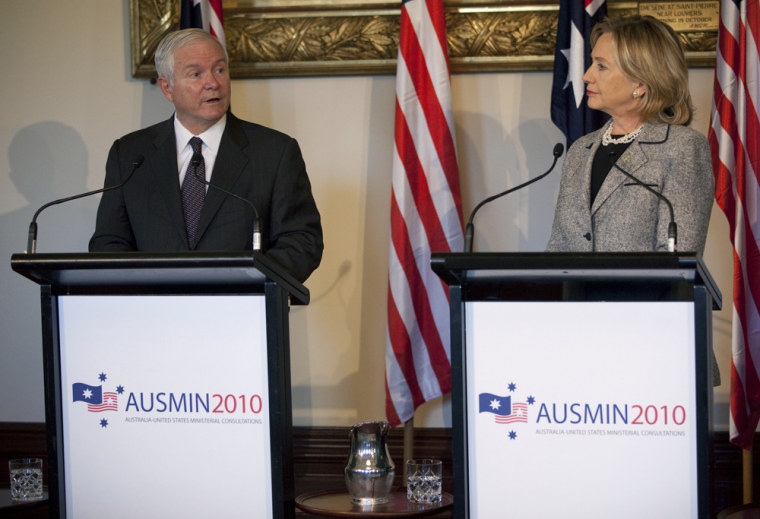The U.S. on Monday rejected Israeli concerns that it had become necessary to pursue a credible military threat against Iran, saying sanctions could deter Tehran from building a nuclear weapon.
The United States fears that Iran's nuclear enrichment program is aimed at developing atomic weapons, but Tehran says the purpose is to produce fuel for atomic power.
"I disagree that only a credible military threat can get Iran to take the action that it needs to end its nuclear weapons program," Defense Secretary Robert Gates told a news conference in Melbourne after security talks with Australia.
"We are prepared to do what is necessary. But at this point we continue to believe that the political, economic approach that we are taking is in fact having an impact in Iran."
Israeli Prime Minister Benjamin Netanyahu told Vice President Joe Biden on Sunday that only a credible military threat can deter Iran from building a nuclear weapon, Israeli political sources said.
Netanyahu's comments marked a departure from the Israeli leader's previous emphasis on using diplomacy to curb Tehran's nuclear ambitions.
Israel sees Iran as its fiercest threat because of its nuclear program, its ballistic missiles capable of hitting the Jewish state and Iranian President Mahmoud Ahmadinejad's repeated references to Israel's destruction.
Biden said after the talks that the sanctions "have a bite" and were having a "measurable impact," though he expressed frustration that Iran had brushed aside overtures made by President Barack Obama's administration.
Gates said that all options remained on the table.
"The president has said repeatedly that when it comes to Iran that all options are on the table and we are doing what we need to do to ensure that he has those options," he said.
Gates said that tough new sanctions approved by the U.N. Security Council were "bringing pressure to bear on the Iran government and getting attention."
"We know that they are concerned about the impact of the sanctions. The sanctions are biting more deeply than they anticipated," he said.
Iranian Foreign Minister Manouchehr Mottaki has said Iran is ready to hold talks on its nuclear program with major powers, and proposed the talks be held in Turkey.
"The Iranians have reached back out and said they would be willing to meet, but so far as I know there is no date or time for that meeting," U.S. Secretary of State Hillary Clinton told the news conference in Melbourne.
"Certainly we have made it clear we would welcome a return to the negotiating table."
Israel's talk of a military threat has raised speculation in Israeli media that Netanyahu, who has rebuffed U.S. and international calls to reimpose a freeze on building in West Bank settlements, was trying to shift the focus of his visit away from the settlement stalemate.
But Netanyahu had made clear that Israel wanted to see if tough economic sanctions could eliminate what it has described as a threat against its existence.
'Critical strategic relationship'
Netanyahu is scheduled to meet Clinton in New York on Thursday for a fuller discussion on Israeli-Palestinian issues. Netanyahu will not see Obama, who is on a 10-day trip to Asia.
"Agreement or not, our commitment to your security is unconditional and complete," one of the Israeli sources quoted Biden as telling Netanyahu.
Biden said later the United States and Israel had a "critical strategic relationship" and it is "one in which we will not yield one single inch."
A 10-month moratorium on housing starts in West Bank settlements expired in late September, some three weeks after direct peace talks began in Washington. Clinton said on Thursday she was working nonstop to break the deadlock.
Diplomats said Washington had offered Israel a package of incentives, including ideas on security, to persuade Netanyahu to resume a partial settlement freeze for two months.
The proposals included U.S. backing for Netanyahu's demand for an Israeli military presence along the Jordan River, the likely eastern border of a future Palestinian state.
But Israeli leaders have balked at what the political sources said was the package's vague time frame for the troop deployment, which Palestinians oppose.
A top Palestinian official said last week the Palestinians would give the United States several more weeks to try to relaunch direct peace talks with Israel.
Netanyahu flies to New York on Monday after speaking to the Jewish Federations conference and will raise in a meeting with U.N. Secretary General Ban Ki-moon Israel's objection to any unilateral statehood moves at the U.N. by the Palestinians, an Israeli official said.
